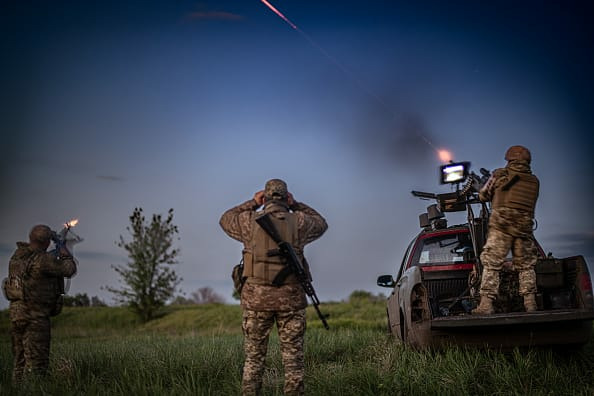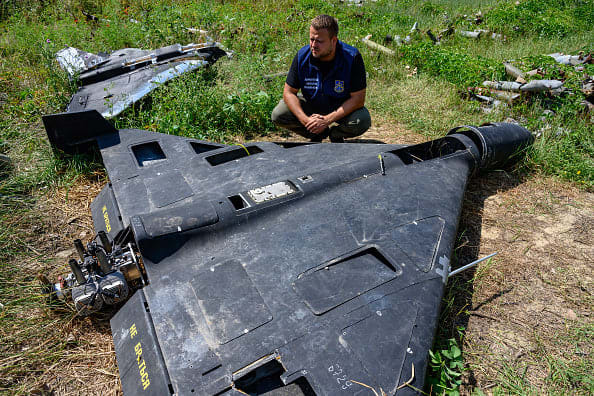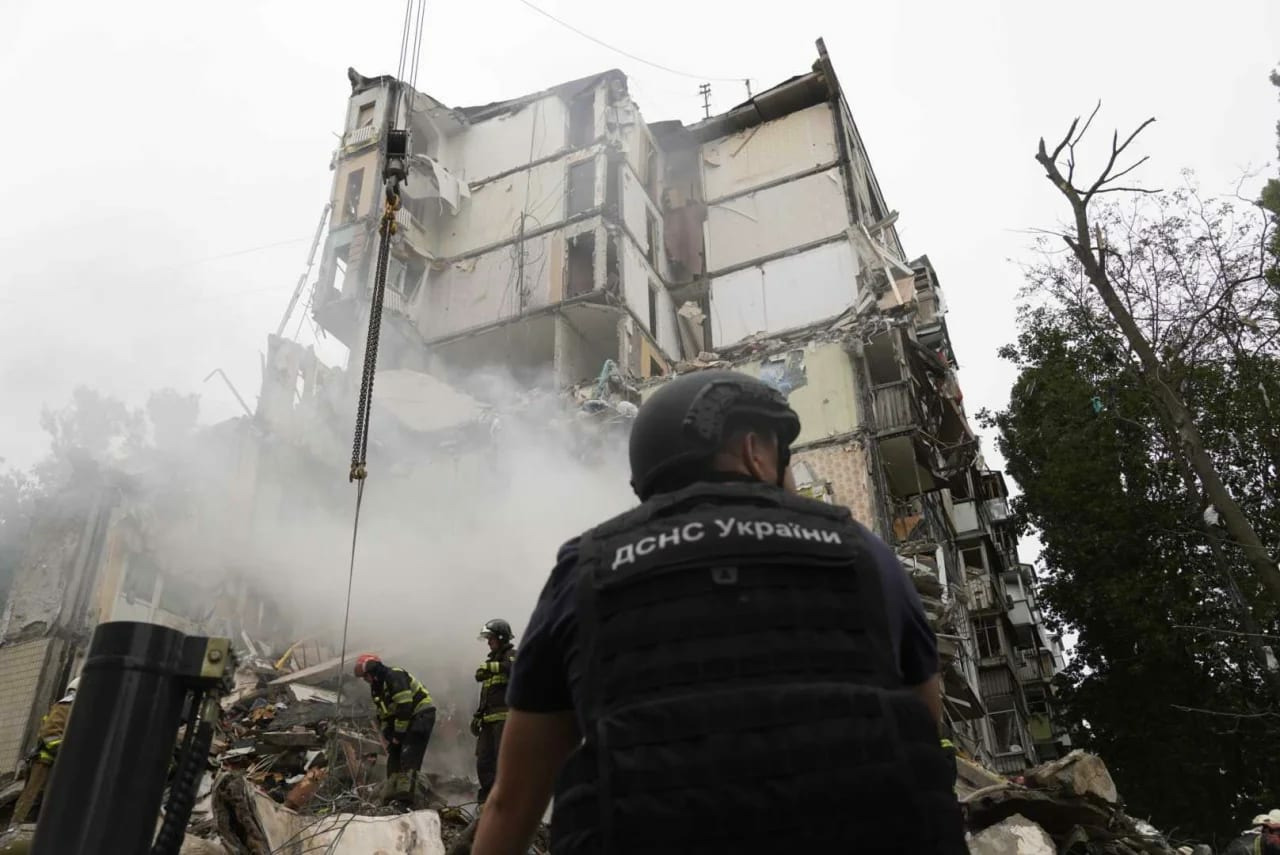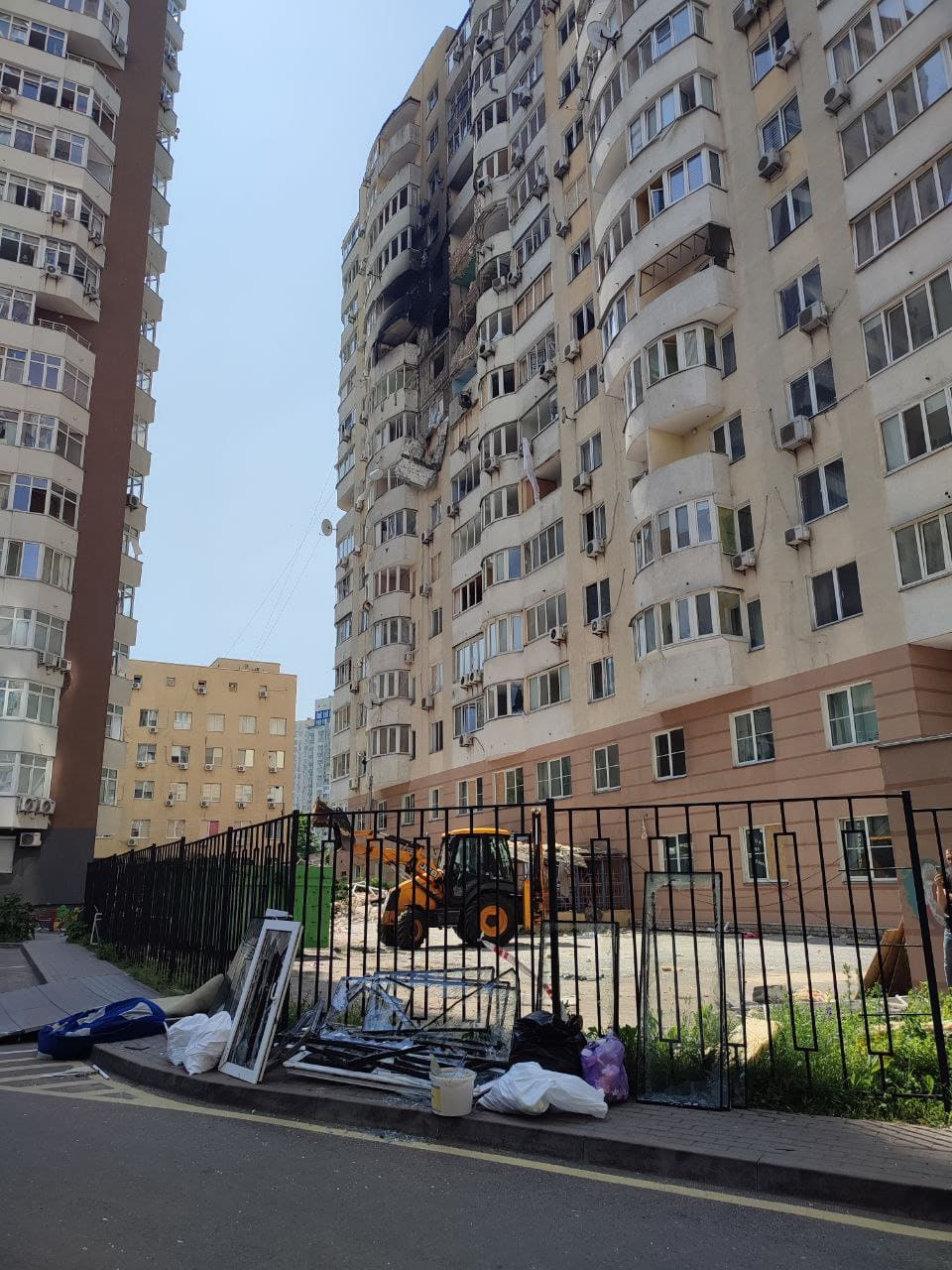Editor’s Note: You can read in other media about what's happening in Ukraine — statistics on casualties, how much territory has been captured or reclaimed. But our media focuses on giving you a sense of what it's like to live through war — to hear deadly sounds at night and to find reminders of war even in moments of calm. Support immersive reporting. Subscribe now!
On a sunny August evening, as I was walking home from work, a family stopped at a traffic light in front of me. A mother with a stroller and her older son were waiting for the green light with me. He looked about 8 years old, energetic – and he was eagerly telling his mother something.
Suddenly, a roar mixed with high-pitched buzzing rolled down the street and swept past us. It felt like it went right through my body. A node of anxiety exploded in my chest.
The boy threw his scooter and covered his ears, clenching tightly in fear.
It was just a motorcycle that rushed by.
Ukrainians in the capital are reminded daily of the terror of the attacks. Simple daily things – such as motorcycles, sports cars, construction sites, trash trucks and thunderstorms – can trigger anxiety in residents as they confuse the sounds with air attacks.
It’s a subconscious reaction, a tightening up. We don’t really have time to ask ourself a question – our bodies themselves react as if to say: Is this an alarm? Is it air defense? Is it a missile?
During the past few months, Russia’s attacks against the capital became larger, louder, and deadlier.
“If it hits, it hits,” me and my roommate Sasha would say every time we heard sirens in the middle of the night.

The sound of an air alert in Kyiv at Maidan Nezalezhnosti recorded by me while I was waiting for my friend.
After getting only two hours of sleep, if that, you wake up, grab coffee from an equally tired barista in a coffee shop, and set yourself up for an eight-hour workday.
"The ballistics are the most frightening during the alerts. They make a loud humming sound, like distant but constant thunder. It's a frightening sound because everything shakes, and you can hear it clearly. The sound of a Shahed drone isn't exactly scary, but it's more annoying; it's a very irritating sound, and you don't want to hear it.
-Katia, a friend with whom I spent almost every air raid in the university dormitory.
Ballistic missile flying over Kyiv while air defense works on it. Sound from Tik Tok video.
Two years ago, when supersonic missiles began to fly actively over Kyiv, I learned to distinguish the sounds between Iranian-made Shahed drones, Ukrainian air defense systems and Russian rockets.
The sound of a rocket flying by. Sound from Tik Tok video.
The anti-drone gun is a familiar sound to me.

It’s similar to what we would hear with fireworks before 2014, when Russia’s invasion of eastern Ukraine started.
After the invasion, my family gave up our New Year’s tradition of setting off fireworks out of respect for people who had moved here from eastern Ukraine, who had experienced daily explosions after Russia’s attack.
The anti-drone gun sound lasts for around 20 to 30 seconds.
When you look up to the sky, you can see dozens of red dots scattered across the sky, the tracers that let Ukrainian soldiers see where their bullets are firing.
In a way, I guess, I had my own version of fireworks during the war.
Anti-drone gun going off. I recorded this sound at 5am under one of June’s attacks.
"If we have experienced a traumatic event, the main focus is not on what happened to us, but on the fact that we survived, thanks to what we did to survive—we reacted to the explosions and went to a safer place. And now these sounds—the loudness, the vibration—are our triggers for surviving again..." Andrii Kozinchuk, a military psychologist and serviceman, told The Counteroffensive.
Russia’s attack on Okhmatdyt, Ukraine's main medical center for treating children, which was hit on July 8, 2024, was an infliction point for me.
The video I took at the Okhmadyt attack site.
The attack occurred during my first week working for The Counteroffensive.
I had to go to the site of the attack and report on the consequences. While I was there, Russia launched a second attack, but the air defense was activated and able to stop the missile.
Sound of air defense working from Tik Tok video.
Tears welled up in my eyes, and my first instinct was to run. Yet, somehow, I forced myself to stay silent and not give in to panic.
After that attack, I began to be more sensitive to any loud noises — I started to flinch at the simple sound of trolleybuses, motorcycles, or things falling at the apartment upstairs.
“I once heard a very loud hum and thought there was an explosion near the house, even though there was no alarm, but it turned out to be a hornet that had flown into the room,” said Myroslava, managing editor of The Counteroffensive.

The Shahed has a more annoying noise, similar to a moped or a giant bee that is flying above you constantly.
Shahed drone falling down and exploding. The audio by Tania’s sister, who recorded it while being under attack.
Shaheds have become Russia’s primary weapon to target Ukrainian cities. The Kremlin is continually seeking ways to modernize and scale up its production, with plans to achieve a monthly production rate of 6,000 Shaheds in the near future.

At the end of July, Russia began to partially introduce jet-powered Shahed drones into its arsenal, which are faster, louder, and more unbearable. This has added extra stress to Ukrainians’ psychology.
"Reactions can vary, even though the external circumstances are the same. It depends on what kind of experience they [people] had before — upbringing, childhood trauma, etc,” said Andrii. Those who had been less exposed to attacks react more, he added.
During one attack in June, a Shahed fell nearby for the first time. It was the most terrifying sound I had heard since the war had started.
“Sasha, it's falling,” I said to my roommate, who was sleeping nearby and hadn't heard anything. I sat in the corner of the bed, hugging my knees and covering my ears. I couldn't stand the piercing, disgusting sound of the drone descending to attack.
The flying drone itself no longer scares me. What terrifies me is the growing hum that turns into a squeak when the drone is close to hitting its target. The seconds of waiting for the explosion seem like an eternity. Your heart stops, you tense up and automatically move away from the window, not knowing when or where the explosion will happen.
How Shahed changes sound when it’s attacking.
Over the past three years, I have also learned what rockets sound like.
They roll in with a continuous thunder, sometimes with a whistle if it is a supersonic rocket. These are the same types of rockets that hit the Okhmatdyt children’s hospital back in July last year.
Ukrainians often say, “If you hear a rocket flying, it means it's not aimed at you” — rockets fly faster than sound, so if you hear it, it means it has already flown past.
Sound of an explosion when the building is hit.
In the morning, you try to return to your normal life. But that doesn't mean that the nightmare from last night won’t catch up with you after dawn.
Holidays are now celebrated without fireworks and firecrackers — something so common for any celebration around the world. Yet, for Ukrainians, they are the sounds of fear and death. Since 2023, there’s been a law banning fireworks and salutes in Ukraine.
The sound of fireworks which reminds of anti-drone gun/air defense. from Tik Tok video.
The sounds of loud motorcycles or sports cars have been the source of anxiety for many Ukrainians as well. It is common for some owners to modify the mufflers in their vehicles so that they produce a louder roar when accelerating. That sound reminds me of a Shahed drone descending.
Motorbike sound which is very similar to Shahed when it’s falling. Sound from Tik Tok video.
In some cities, the use of vehicles with modified mufflers and exhaust pipes is punishable by a fine of approximately $2 to $6. At the national level, the new bill has not yet been adopted.
When a motorcycle flies by on a sunny, peaceful day, my brain seems to scream, "Stop! This is my peaceful time without anxiety and attacks! Don't remind me of explosions and sleepless nights right now!"
The surge of anxiety paralyzes my body for a moment, my eyes immediately search for the source of the sound, and my ears listen to see if similar sounds are happening around.
Sometimes I may not react at all, which happens when my anxiety is already high before I hear the sound. In this state, I am focused and tense by default, so in a sense, I am already in survival mode and remain alert.
Trash truck sounds, which can often happen late at night, when you don’t expect to hear anything like this.
“At first, the brain doesn't interpret it as a motorcycle,” said Kozinchuk. He added that the first moment you listen to the sound, you immediately feel like you need to hide. Then, our brain reacts: “No, no, no, dude, or lady, it's just a motorcycle”... Essentially, it's a survival principle.”
I recently moved out from my dorm to an apartment and went from having friends and a shelter to rely on, to having nothing. The first time I hid in the bathroom of my new place was in early August, when I heard the sound of explosions.

This time, I had no conversations nor jokes to distract myself with. It turned out not to be an attack, but someone playing with fireworks nearby.
Now every attack feels like it could really be the last.
Authorities warn of more frequent direct hits on buildings, in which the chances of survival are almost zero, especially for old panel buildings, which are prevalent in Ukrainian cities. Even if you hide in a basement or shelter, the floors of these buildings would simply collapse if hit.

I don't remember what life was like before the war. I don't know my state of mind or emotions before the sleepless nights spent under explosions. It's hard for me to imagine that one day I will be able to return to my former reality or stop flinching at every unexpected loud noise.
Riding with my dad on his motorcycle and our family's New Year's tradition of setting off fireworks are some of the warm childhood memories that I will always cherish.
Still, I hope that someday I will be able to create such memories for my children without feeling fear or anxiety.
Editor’s Note: You can read in other media about what's happening in Ukraine — statistics on casualties, how much territory has been captured or reclaimed. But our media focuses on giving you a sense of what it's like to live through war — to hear deadly sounds at night and to find reminders of war even in moments of calm. Support immersive reporting. Subscribe now!
Join The Counteroffensive founder Tim Mak today at 11 am EST live on America, America with Steven Beschloss.
NEWS OF THE DAY:
By: Tanya Novakiska.
Good morning to readers; Kyiv remains in Ukrainian hands.
OIL SUPPLY TO MOSCOW DISRUPTED: Ukrainian drones attacked the pipeline that sends petroleum to Moscow, causing a fire on the oil pipeline located 200km from Moscow. The delivery of petroleum to the Russian capital has been suspended indefinitely.
Russia's energy sector is one of the most important in supporting its military economy. Ukrainian attacks on Russian oil refineries have disrupted at least 17 percent of Russia's oil refining capacity, or approximately 1.1 million barrels per day. Due to the attacks, there is also a gasoline shortage in some regions of Russia, and gasoline exports were banned until the end of August.
KREMLIN IS PUTTING PRESSURE ON BUSINESSES TO REPLENISH BUDGET:
The Kremlin is increasing inspections on small and medium-sized businesses to replenish its budget. Initially, inspections were used to protect the consumer. Yet, in practice, Russian state authorities are tightening controls on companies and issuing fines.
During inspections, numerous abuses and violations of inspection procedures were recorded, such as demanding excessive amounts of documentation, imposing commercial services, delaying procedures, and imposing fines that are disproportionate to the nature of the violations. In several cases, there have also been instances of direct bribery.
CHINA PRESENTS WEAPONS CAPABLE OF REACHING THE TERRITORY OF THE UNITED STATES: Military analysts have identified new models of hypersonic systems that could surpass the US Navy in the western Pacific and reach U.S. territory. The satellite images were taken from the training ground of the Chinese People's Liberation Army, where a military parade is scheduled to take place on September 3.
China is one of the most prolific developers of hypersonic missiles, which are currently very difficult to intercept with any existing air defense and missile defense systems.
DOG OF WAR:
Nastia spotted this cutie when she went to grab lunch at a cafe near our office. We hope he had a nice summer and is getting ready for the cold, but romantic Kyiv autumn.
Stay safe out there.
Best,
Nastia





